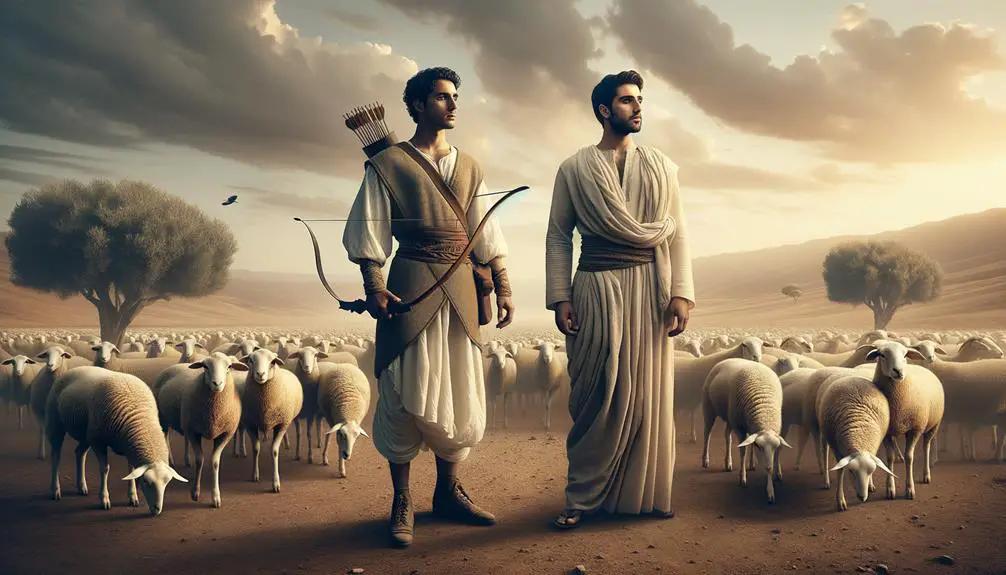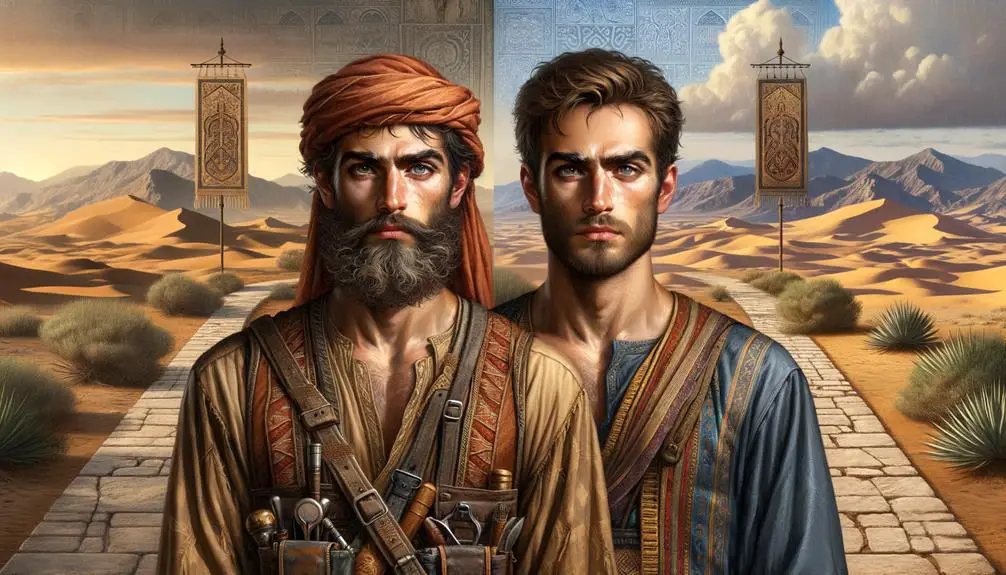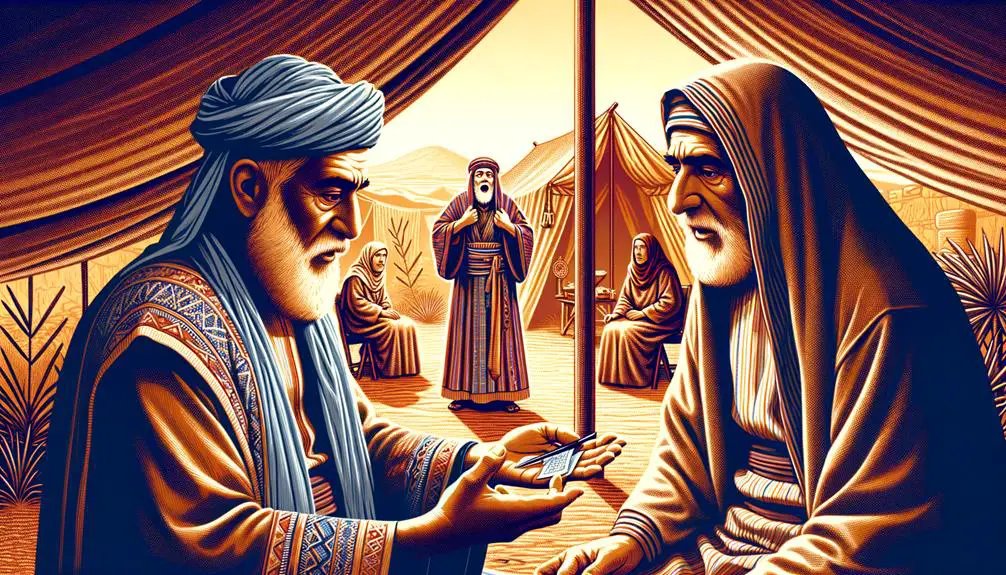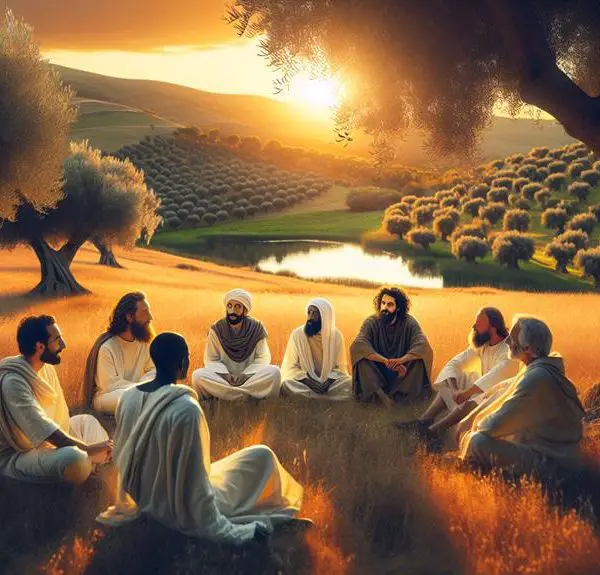Journey into the biblical saga of Isaac's sons, Esau and Jacob, to uncover a tale of rivalry, redemption, and the shaping of nations.

Who Were Isaac's Sons in the Bible
In the biblical narrative, Isaac's sons, Esau and Jacob, emerged from the womb entwined in conflict and carried that discord into adulthood. You've likely heard their names, but the depth of their stories encompasses themes of rivalry, redemption, and the shaping of nations.
As you explore their lives, you'll uncover how their personal struggles and decisions echo through history, influencing not just their immediate family but entire generations. The question of who they were goes beyond mere names; it invites you into an exploration of complex characters whose legacies are still relevant today.
Why does this matter? Their stories offer a mirror into our own struggles with family, identity, and destiny.
Key Takeaways
- Isaac's sons, Esau and Jacob, were central figures in biblical narratives, embodying themes of rivalry and divine destiny.
- Esau, the elder, sold his birthright to Jacob, leading to significant future implications for their descendants.
- Jacob, through deceit and divine favor, acquired both Esau's birthright and Isaac's blessing, setting the stage for the nation of Israel.
- Their stories reflect complex family dynamics, including parental favoritism and the profound impact of inheritance and blessing.
Early Life of Isaac

Isaac's early life, marked by divine intervention and familial complexities, sets a foundational narrative for understanding his later roles as both father and patriarch in biblical history. Born to Abraham and Sarah in their old age, his birth itself is a fulfillment of God's promise, a cornerstone of the Abrahamic covenant that underscores faith and obedience. This covenant, central to Isaac's existence, not only earmarks him as a pivotal figure in the lineage of the Israelites but also as a vessel through which God's blessings flow to future generations.
Navigating through Isaac's early experiences, you'll notice how his life is interwoven with trials and divine tests, notably the binding of Isaac, where his faith and that of his father's were profoundly tested. This event not only highlights the depth of faith and commitment of his family to God's will but also solidifies Isaac's role in the fulfillment of the Abrahamic covenant.
Isaac's marriage to Rebekah, orchestrated by divine guidance, further cements the continuity of the covenant. His choice of spouse wasn't merely a personal or familial decision but a fulfillment of divine will, ensuring that the lineage through which the covenant's promises would materialize was preserved. Their union, marked by prayer and divine intervention, underscores the perpetuation of the covenantal blessings and the crucial role of marriage in advancing God's plans.
Through these events, Isaac's early life emerges not just as a series of happenstances but as a carefully orchestrated divine plan, laying a robust foundation for his roles as father to his sons and a patriarch whose lineage carries forward the Abrahamic covenant.
Birth of Esau and Jacob
Building on the foundation of Isaac's early life and divine encounters, the birth of Esau and Jacob marks a significant continuation of the Abrahamic covenant through intricate familial dynamics and divine prophecy. The narrative of their arrival is a pivotal moment, deeply entwined with the concept of parental favoritism and a divine pregnancy oracle that sets the stage for their life paths and the unfolding of their destinies within the biblical narrative.
Rebekah's struggle during pregnancy leads her to seek divine insight, resulting in a pregnancy oracle that foretells the future of her twins: two nations are in her womb, with the older serving the younger. This prophecy not only prefigures the complex relationship between Esau and Jacob but also underscores the divine intervention and guidance in their lives from the very beginning.
The birth of Esau and Jacob isn't merely a familial event but a divine orchestration that aligns with God's covenantal promises to Abraham. Esau, emerging first, is described as red and hairy, a detail that foreshadows his earthy, impulsive nature. Jacob, following closely, holding Esau's heel, is symbolic of his later endeavors to supplant his brother and achieve a position of prominence.
Parental favoritism further complicates their story. Isaac's preference for Esau and Rebekah's for Jacob not only reflects their personalities and affinities but also plays a critical role in the unfolding of the biblical narrative, influencing key decisions and events in their lives. This dynamic sets the stage for future conflicts and the eventual fulfillment of the pregnancy oracle, highlighting the intricate interplay between divine prophecy and human agency.
Esau's Heritage

Delving deeper into the biblical narrative, Esau's heritage emerges as a complex tapestry of familial relationships, divine prophecies, and the resulting socio-political ramifications that shape his identity and legacy. As the elder son of Isaac, Esau's decisions and interactions set the stage for the rise of the Edomite nation, a people characterized by their robust leaders and distinct cultural practices.
Esau's choice to sell his birthright and the subsequent loss of his father's blessing to Jacob, his twin brother, did not merely result in personal loss but also paved the way for the establishment of a lineage that would become significant in the biblical context. The Edomites, descendants of Esau, are repeatedly mentioned throughout the biblical text, highlighting their complex relationship with the Israelites. This relationship was marked by both conflict and cooperation, illustrating the intricate dynamics between these closely related peoples.
The Edomites were known for their formidable rulers and unique cultural practices, which set them apart in the ancient Near East. Their legacy is encapsulated in the following table, summarizing key aspects of Esau's heritage:
Aspect |
Description |
|---|---|
Edomite Rulers |
Known for their strong leadership and governance. |
Cultural Practices |
Included distinctive traditions and rituals. |
Relationship with Israelites |
Complex, ranging from conflict to cooperation. |
Biblical Significance |
Played a significant role in biblical narratives. |
Legacy |
Influenced the socio-political landscape of the time. |
Esau's heritage, therefore, is not just a story of individual fate but a reflection of the broader themes of rivalry, reconciliation, and the enduring impact of one's lineage on history.
Jacob's Journey
You'll find Jacob's journey in the Bible rife with pivotal moments that shaped the course of biblical history. His acquisition of Esau's birthright and blessing underlines themes of deceit and destiny, setting a complex stage for his future.
The dream at Bethel and the wrestling encounter at Peniel not only reveal Jacob's evolving relationship with God but also mark significant transformations in his identity and purpose.
Birthright and Blessing Theft
Jacob's journey into deceit began when he acquired his brother Esau's birthright, a pivotal moment that reshaped their destinies and the biblical narrative's course. This act, steeped in cultural norms and legal implications, highlights the weight of birthright in ancient times.
- Cultural norms dictated the firstborn's superior inheritance and societal status.
- Legal implications meant the birthright holder had rights to a double portion of the inheritance.
Jacob's cunning in exploiting Esau's moment of weakness underscored the manipulative strategies employed. The eventual theft of Isaac's blessing further complicated their relationship, intensifying the deceit.
This narrative sets a precedent for understanding the complexities of familial bonds and inheritance disputes in biblical times, emphasizing the lengths to which individuals would go to secure their legacy.
Dream at Bethel
As you journey further into the biblical narrative, it becomes clear that the dream at Bethel marks a pivotal moment in Jacob's life, revealing profound spiritual truths and divine promises that would shape the destiny of a nation.
Here, Jacob's ladder emerges not just as a vivid image but as a symbol of the divine encounter bridging heaven and earth. This dream at Bethel signifies God's unwavering presence and assurance to Jacob, despite his previous actions.
It's a transformative episode, where promises of land, numerous descendants, and blessings for all the earth's families are conveyed directly to Jacob. This divine encounter underscores the intricate relationship between human choices and divine guidance, highlighting a pivotal shift in Jacob's journey and solidifying his role in the ancestral narrative.
Wrestling at Peniel
In the dead of night, wrestling at Peniel becomes a crucible for transformation in Jacob's journey, revealing the complex interplay between human struggle and divine intervention. This pivotal angel encounter marks a profound identity transformation for Jacob, shifting the trajectory of his life and lineage.
- Divine Encounter: Jacob grapples with a mysterious figure, later revealed as an angel, symbolizing a direct confrontation with the divine.
- Endurance: The struggle lasts until dawn, highlighting Jacob's determination and resilience.
- Blessing and Name Change: Emerging victorious, Jacob is blessed and renamed Israel, signifying his strengthened relationship with God.
- Physical Reminder: Jacob's hip injury serves as a lifelong reminder of this spiritual encounter.
- Legacy: This event not only transforms Jacob personally but also sets the foundation for the nation of Israel.
Sibling Rivalry Escalates
ARTICLE TITLE: Isaac's Sons in the Bible
PREVIOUS SUBTOPIC: 'Wrestling at Peniel'
CURRENT SUBTOPIC: 'Sibling Rivalry Escalates'
Sibling rivalry between Isaac's sons, Esau and Jacob, intensified markedly when Jacob deceived their father to obtain the blessing meant for Esau, his elder brother. This act of deceit didn't just happen in a vacuum; it was the culmination of years of growing tension, underpinned by parental favoritism and a lack of effective conflict resolution. Isaac's preferential treatment of Esau and Rebekah's bias towards Jacob set a foundation for competition and deception that ultimately led to a significant family rift.
Aspect |
Impact |
|---|---|
Parental Favoritism |
Deepened the emotional divide between the brothers |
Deception |
Escalated the conflict to a point of no return |
Lack of Communication |
Prevented any form of early conflict resolution |
Birthright Sale |
Set the stage for further disputes and resentment |
Blessing Theft |
Cemented the breach in their relationship |
Analyzing this escalation, it's clear that the seeds of discord were sown early on, nurtured by a lack of parental neutrality and communication. The dynamics between Esau and Jacob serve as a vivid illustration of how deeply sibling rivalry can impact family unity. Without avenues for open dialogue and fair treatment, minor grievances can evolve into irreparable rifts. In their story, the absence of conflict resolution mechanisms not only fueled their personal vendetta but also set a precedent for how disputes were handled within their lineage.
The Blessing Controversy

As you explore the narrative of Isaac's sons, the blessing controversy stands as a pivotal moment, marking Esau's lost birthright and Jacob's deceptive triumph.
This incident not only shifts the familial dynamics but also sets the stage for the future of their descendants.
Understanding this controversy requires a close examination of the motivations, the deceit involved, and its profound implications for both brothers and their lineage.
Esau's Lost Birthright
Esau's decision to sell his birthright to Jacob for a simple meal marks a pivotal moment in biblical history, highlighting the profound consequences of undervaluing one's inheritance. This event underscores the weight of ancient customs and the deep significance of heirlooms in shaping one's destiny.
- Ancient customs dictated that the firstborn son inherited a double portion of the family's wealth and the leadership mantle.
- Heirlooms weren't merely physical items but symbols of a family's continuity and blessing.
- Esau's impulsive choice reflects a disregard for these time-honored traditions.
- This act of selling his birthright for temporary satisfaction reveals a short-sightedness that would haunt his lineage.
- Jacob's willingness to secure the birthright underscores the contrasting values between the brothers concerning their heritage's worth.
Jacob's Deceptive Triumph
Jacob's deceptive triumph over Esau, securing their father Isaac's blessing, further complicates the narrative of inheritance and sibling rivalry in biblical history. This pivotal moment, steeped in parental favoritism, showcases Jacob's cunning as he capitalizes on Isaac's blindness and Esau's absence.
By disguising himself as Esau, Jacob not only usurps the blessing meant for his brother but also highlights the profound cultural implications of birthright and blessing in ancient times. Such actions underscore the weight of paternal approval and the lengths to which individuals might go to obtain it.
Moreover, Jacob's maneuver sheds light on the intricate dynamics of family relationships, where love and rivalry often intertwine, leaving a lasting impact on the subsequent generations. This episode serves as a critical reflection on the power of deception and ambition within familial bonds.
Legacies of Isaac's Sons
The legacies of Isaac's sons, Esau and Jacob, have profoundly shaped the course of biblical history and religious tradition. Isaac's influence on his sons' impact is undeniable, setting the stage for their distinct paths and the far-reaching consequences of their actions. Here's a closer look:
- Jacob's transformation to Israel: Jacob's journey from trickery to becoming the patriarch of the Israelites marks a significant turn. His twelve sons became the founders of the Twelve Tribes of Israel, underscoring his monumental role in Jewish history.
- Esau's legacy and the Edomites: Despite Esau's loss of his birthright and blessing, he became the progenitor of the Edomites. His descendants played a notable role in the region's history, often in conflict with the Israelites, illustrating the lasting rift between the brothers.
- Spiritual symbolism: Jacob and Esau's story transcends their historical impact, embodying spiritual and moral lessons. Jacob's transformation and reconciliation with Esau offer insights into repentance, forgiveness, and the power of change.
- Cultural and religious influence: Their narratives have inspired countless interpretations in Jewish, Christian, and Islamic traditions. Each brother's story serves as a moral compass, teaching about the consequences of actions and the importance of faith and family.
- Genealogical significance: The genealogies stemming from Esau and Jacob are crucial for understanding biblical lineage and prophecy. Their descendants' interactions highlight the complex dynamics of familial relationships and their lasting effects on subsequent generations.
Analyzing the legacies of Isaac's sons, you'll find that their stories aren't just historical accounts but lessons woven into the fabric of religious identity and cultural heritage.
Frequently Asked Questions
How Did Isaac's Relationship With His Wife, Rebekah, Influence the Dynamics Between Esau and Jacob?
Isaac's relationship with his wife, Rebekah, deeply influenced the dynamics between their children due to paternal favoritism and the controversial birthright sale.
You'll see that Isaac's preference for one child and Rebekah's for the other created a rift, steering the siblings into a competitive and deceitful relationship.
This favoritism and manipulation surrounding the birthright sale not only strained their brotherhood but also shaped their destinies in profound ways.
Are There Any Archaeological Findings That Corroborate the Biblical Accounts of Isaac's Sons, Esau and Jacob?
Imagine being a detective, piecing together history's puzzles. When you're delving into historical verification of Esau and Jacob, you'll find the archaeological evidence is sparse.
Despite this, their story has a profound cultural impact, shaping traditions and beliefs. Scholars often grapple with the lack of direct artifacts, relying instead on textual analysis and historical context to understand their significance.
This analytical approach underscores the challenges in corroborating biblical accounts with archaeological finds.
How Have Different Religious Traditions Interpreted the Characters and Actions of Esau and Jacob Differently?
In exploring how religious traditions interpret Esau and Jacob differently, you'll find fascinating contrasts. Esau's repentance and Jacob's dreams are pivotal.
Jewish interpretations often highlight Jacob's visionary qualities, marking him as a key patriarch, while Christian traditions might emphasize Esau's repentance as a lesson in forgiveness and redemption.
Each perspective offers deep insights into their characters, revealing the complex layers of these stories beyond their biblical origins.
What Psychological Interpretations Have Been Proposed to Explain the Complex Family Relationships and Sibling Rivalry Depicted in the Story of Isaac's Sons?
Did you know 85% of people have at least one sibling? This statistic piques interest when delving into sibling psychology, particularly in analyzing complex family dynamics.
Experts suggest the rivalry over birthright significance, as seen in historical narratives, mirrors real-life competition for parental attention and resources. This lens offers a fascinating insight into the emotional and psychological underpinnings driving behaviors, emphasizing the depth of sibling relationships and their impacts on personal development.
In What Ways Have the Stories of Esau and Jacob Been Referenced or Symbolized in Modern Literature and Popular Culture?
In modern literature and popular culture, you'll find Esau and Jacob's stories deeply embedded as literary motifs and cultural references. These narratives have evolved into symbols of rivalry, reconciliation, and destiny.
You'll notice them influencing character dynamics, themes of inheritance and betrayal, and even shaping moral lessons in novels, films, and television shows. They serve as a mirror to human complexity, enriching stories with layers of historical and emotional depth.
Conclusion
In conclusion, Isaac's legacy through his sons, Esau and Jacob, highlights the profound impact of familial dynamics on historical and spiritual narratives. Their story, marked by rivalry and reconciliation, exemplifies the complex interplay of destiny and free will.
Consider the case of two contemporary siblings vying for a family business inheritance; their struggle mirrors Esau and Jacob's, underscoring timeless themes of ambition, betrayal, and ultimately, redemption.
Isaac's sons' journeys thus offer enduring lessons on the human condition, emphasizing the intricate balance between personal desires and divine providence.



Sign up